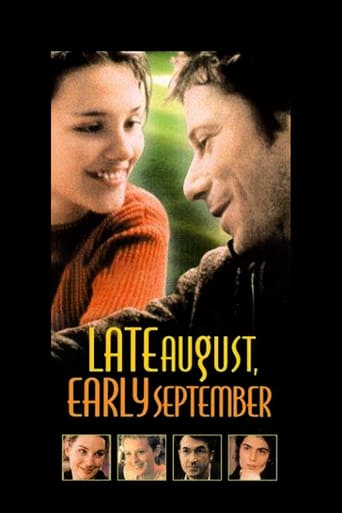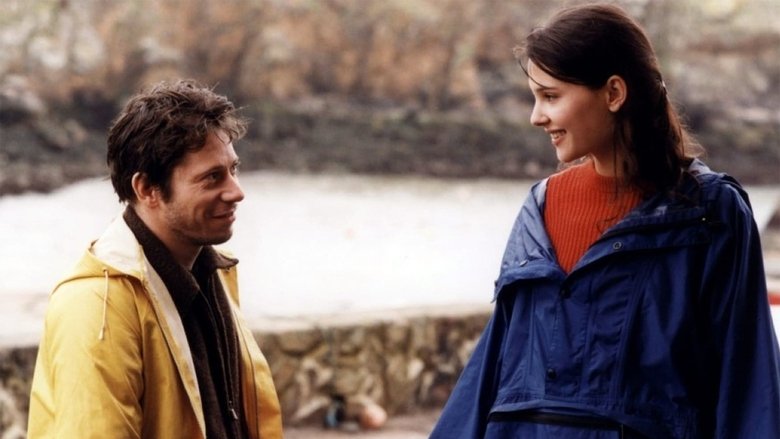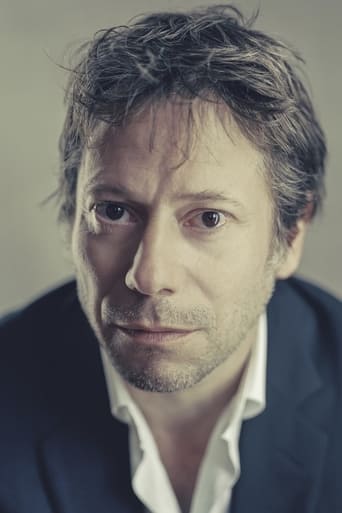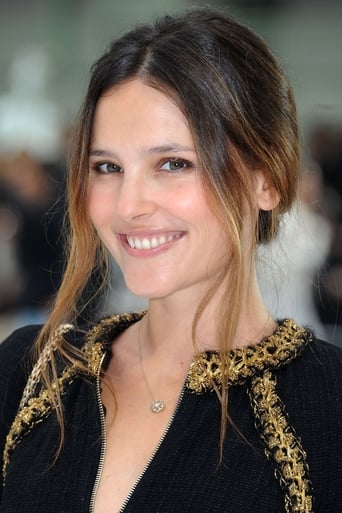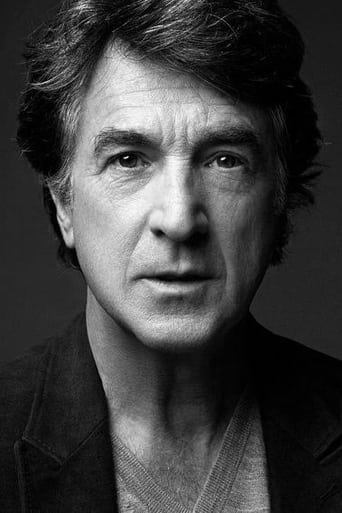Late August, Early September (1999)
A book editor juggles relationships with two women while coping with his best friend's terminal illness.
Watch Trailer
Cast


Reviews
How sad is this?
Excellent but underrated film
A lot of fun.
This is a coming of age storyline that you've seen in one form or another for decades. It takes a truly unique voice to make yet another one worth watching.
Like many French movies, not a lot happens in this one. It follows a group of acquaintances for about a year. There are loves gained and lost, families who fight, and some who don't, secret affairs, and open ones, friends who sit around and talk in coffee shops, a lot of really mundane stuff. The bright spot is Virginie Ledoyen, who is just too pretty. (A cool thing is that French women seem to have discovered razors!!!) There is certainly a place for character studies, and slow-moving films. But this one failed to appeal to me on any level. Perhaps the language barrier was too much for me to overcome. I can't recommend this one.
This is a pretty stereotypical French film in that involves a lot a not-terribly-interesting, very bourgeois French people talking endlessly about their personal relationships and the meaning of life (I wasn't expecting Hollywood-style gun fights and car crashes, but there has to be a happy medium somewhere). The bland lead is dealing with his failed relationship with his long-time ex-girlfriend and his inability to commit to his present lover (Virginie Ledoyen)as he also comes face-to-face with his unrealized literary ambitions and the imminent death of his older and slightly more successful mentor. The dying mentor, meanwhile, is a published but still obscure author. Although he is middle-aged, he has taken on an unusually precocious fifteen-year-old as a mistress--why? because this a French movie, the country that gave us Eric "Claire's Knee" Rohmer and was the first to publish Vladimir Nabokov's scandalous novel "Lolita"--making borderline pedophilia look vaguely classy seems to be a longstanding French cinematic tradition.The best reason to watch this movie is for Virginie Ledoyen who is most familiar to American audiences as Leonardo DeCaprio's girlfriend in "The Beach" and for her appearance on the cover of a number of lowbrow men's magazines like "Maxim". She is actually a pretty good actress though and the movie shows some signs of life whenever she is on screen (which is all too infrequently I'm afraid). The only other remarkable things about this movie is the relative dearth of sex scenes (although there is one memorable very one with Ledoyen near the end)and the fact that many of these characters actually seem to have jobs(!)and are not just lounging on the beach or in the countryside as is usually the case in French movies. Other than that this film is very stereotypical. If you like talky French movies in general, you'll probably like it, but if not, I wouldn't bother.
Late August, Early September is a movie that will stay with me because it didn't make me obsessed over it right after i saw it. In fact, as time passed, I realized 'gee, the last best time I had with a movie was Fin Aout". So I saw it again, took a deep breathe, and realized it really was a rare, marvelous movie that I feel lucky and nourished to see.I'm suprised that noyone was asking where the music in the movie came from. Well, in case you just saw it and wondered really hard like i did, all the music that was thematiclly featured are by a south African music group called Ali Farka Toure, all the songs are from their album "The Source", and the songs are---(for the opening and the motorbike) "Goye Kur", (for Virginie Ledoyen's threesome scene) "Hawa Dolo", (for Vera's theme, the closing and many parts, the essential theme) "Cinquante Six". I'm utterly moved at seeing Olivier Assayas accomplishment. The lingering, graceful, and intricate portrayal of modern people, throughly, relevantly modern. His water-color painting, which it's moods unexpectedly stay with you after seeing the film. The chosen characters and the bold realities of their conceptions sort of leave me caring about things again. The film showed me processes of natural acceptances and natural complications in life, not mimicking it, just tip toeing through it, yet the character's lives seems to always be existing and experiencing itself in between or before the time frames of the film and so on, so forth. I took that swift, bitter-sweet feeling inside me and kept thinking about the beautiful credits. I kept feeling pleased at how I get to see charcters having been so tormented but keeping so much in, a state that uncannily comforts a lot of my trivial, constant, day to day basis state of mind. Assayas is an auteur, in a really modern sense. He writes his own things, which guarantees his vitality. I have utter faith in him and I'm grateful that his films are made, just there, living.
The style of the film, described elsewhere as in the 'Dogme 95' genre, really works well for this story, especially on the cinema screen; on video, the transfer was made from a slightly poor-quality print, which is too bad - the photography in the movie is excellent. For the technically-oriented, "Fin Aout, Début Septembre" was filmed in Super-16mm, and in my opinion this sort of plot is perfectly suited to the S16, or the DV-originated type of storytelling technique. It's true there was no murder or gratuitous violence, no rape or incest, no endless spurting of tears and confessions, which is frankly the reason I love this film. The dialogues are believable, the characters are very real, with that feeling of people we've known and maybe not always loved or cared to be around, but who are part of life nonetheless...I admire a filmmaker who is willing to present characters that are based in life, not in movie clichés, and Assayas pulls it off here wonderfully in my opinion.

